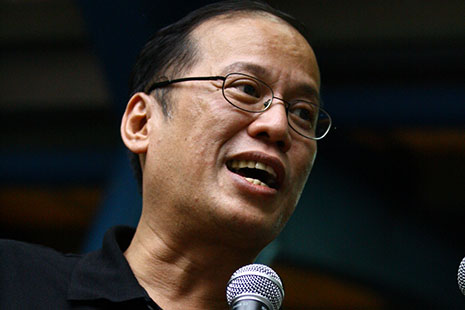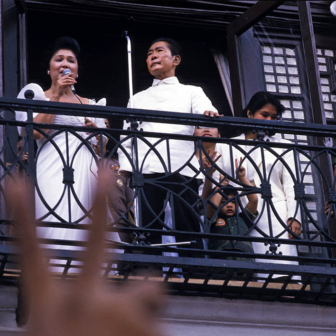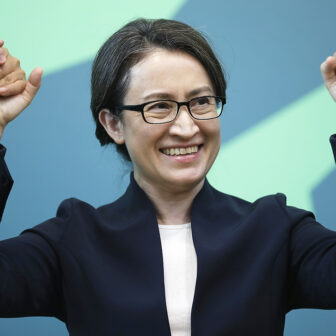“Go ahead, impeach me,” yelled the headline of a major daily in the Philippines earlier this month, encapsulating president Benigno S. Aquino III’s challenge to critics threatening to file an impeachment complaint against him. Opponents of the president – who came to office with the nickname of Noynoy but is now popularly known as “PNoy” (short for President Noynoy) – allege that he exceeded his powers by channelling savings from the government’s budget to other programs through what is known as the Disbursement Acceleration Program. For these critics, the president’s challenge was a sign of arrogance; for his supporters, he is justifiably confident that any attempt to oust him won’t succeed.
PNoy’s confidence is probably not misplaced. Despite a longstanding controversy about a scam that took advantage of a pork-barrelling mechanism called the Priority Development Assistance Fund, or PDAF, and recent questions about the constitutionality of the disbursement funds, PNoy has performed creditably during the first half of his first term as president.
The Philippine economy has strengthened, posting sustained growth in every quarter since PNoy won power – so much so that the country is now considered one of Asia’s investment bright spots by financial institutions and economists. Annual GDP growth rates reached a high of 7.5 per cent in the second quarter of 2013 after four quarters of annualised growth above 6 per cent. That second-quarter performance made the Philippines the fastest-growing economy in Southeast Asia and put it on par with China. For 2013 as a whole, financial institutions expect close to 7 per cent GDP growth, tapering to a respectable 6 per cent in 2014.
Despite the pace of growth, PNoy’s administration has succeeded in keeping inflation at bay. Year-on-year, inflation in September 2013 was lower, at 2.7 per cent, than last year’s 3.8 per cent. In a country where prices of basic commodities are considered an urgent national concern, keeping down inflation has allowed the administration in general, and PNoy in particular, to retain high approval ratings. Business also remains upbeat. In its business confidence report, the Bangko Sentral ng Pilipinas (Central Bank of the Philippines) notes that business sentiment remained favourable in the third quarter of 2013 and that businesses were even more bullish about the prospects for the last quarter of this year, with 60 per cent of those surveyed expecting considerable growth.
Reflecting the economy’s performance, the three main credit ratings agencies – Fitch Ratings, Standard & Poor’s, and Moody’s – have given the country its first investment-grade scores since the Philippines was first rated two decades ago. In the 2013–14 report of the Global Competitiveness Index the country moved up from seventy-fifth (out of 142 countries) in 2011 to fifty-ninth (out of 148), and the health of its institutions has improved markedly, according to the report, as a result of the administration’s decision to make “the fight against corruption an absolute priority.”
Acting on the first part of his campaign slogan, “If no one is corrupt, no one will be poor,” PNoy launched an offensive against corruption on his first day in office, railing against the abuses of the past and vowing to pursue a tuwid na daan (straight path). His first executive order called for the establishment of a Philippine Truth Commission, which would seek out, investigate and assess “reports of graft and corruption of such scale and magnitude that shock and offend the moral and ethical sensibilities of the people.”
Although the Supreme Court declared the order unconstitutional, the administration wasn’t deterred from going after the big fish. Ombudsman Merceditas Gutierrez and chief justice Renato Corona – both closely linked to former president Gloria Macapagal Arroyo – were subject to impeachment proceedings initiated by PNoy’s allies in Congress. Gutierrez was impeached by the Lower House in September 2010 on charges that she was “alarmingly and unjustifiably passive in taking on prominent issues involving corruption and malfeasance at the highest levels of government.” She was able to delay her trial by appealing to the Supreme Court, but her impeachment was confirmed in February 2011. Before she could be tried by the Philippine Senate, which is constitutionally mandated to act as the impeachment court, she tendered her resignation.
President Arroyo’s decision to appoint Renato Corona as chief justice late in her presidency drew PNoy’s ire during the presidential campaign in early 2010. PNoy departed from the custom of having the chief justice swear a new president into office by requesting to be sworn in by a village chief from his home town, although he subsequently agreed to have the oath administered by a senior associate justice of the High Court. After the Supreme Court’s rejection of his first executive order, and of a restraining order designed to stop former President Arroyo from leaving the country (purportedly to seek medical treatment), PNoy rallied his supporters in the Lower House to impeach the chief justice. Corona was removed by the Senate in May 2012.
For her part, Gloria Arroyo is currently the subject of three cases filed by the administration – the first over her alleged role in manipulating the results of the 2007 Senate elections, and the remaining cases relating to misuse of government funds.
PNoy has also directed government agencies to make their transactions more transparent. All national agencies must make information about their projects available online, and all businesses seeking government contracts must be accredited via a new electronic procurement system. At the subnational level, the Department of Interior and Local Government now requires all local government units to make public their budgets, projects and expenditures. Compliance with this full-disclosure policy is a prerequisite for a “seal of good housekeeping” from the department, which entitles them to apply to the Performance Challenge Fund for additional funding for climate change adaptation and economic development projects.
THE other half of PNoy’s campaign slogan – “no one will be poor” – is captured by the primary goal of his administration’s medium-term development plan, inclusive growth. In pursuit of this goal, the administration prioritised social and infrastructure expenditure in the first half of its term.
As a result, expenditure on social development has increased markedly since 2010. Formal schooling at the primary and secondary levels has been extended from ten to twelve years and the budget for schools will increase by an annual average of 18 per cent between 2011 and 2014.
The flagship of the government’s effort to reduce poverty, the Pantawid Pamilyang Pilipino Program (or 4Ps) – the Philippine version of the conditional cash transfer programs introduced in other countries – has been expanded and given extra funds. 4Ps provides cash incentives to households that comply with certain conditions: pregnant women must use pre- and post-natal care, parents must attend family development sessions, children must receive regular preventive health checkups and vaccinations until the age of five, and school-age children must attend 85 per cent of their classes. From an allocation of P10 billion (A$243 million) in 2010, the proposed budget for the 4Ps has increased to P62 billion (A$1.5 billion) for fiscal year 2014 as the program expands to cover high school students and an additional 200,000 household beneficiaries. As of late June 2013, 4Ps had over 3.9 million beneficiaries; by 2014, the government’s 4Ps will cover one out of every five households in the country.
After a sluggish start, PNoy’s administration has also prioritised infrastructure spending. Over the past three years, the government has allotted larger sums for expanding farm-to-market roads, rehabilitating irrigation systems, rehabilitating and constructing national and secondary roads, and upgrading tourism and transport infrastructure. All these increases, as noted by one economist in an assessment of the government budget, are “consistent with the need to increase funding for basic infrastructure to help ensure more inclusive growth.”
Perhaps the most important reason why PNoy is confident of surviving any attempt to impeach him is his remarkable stock of political capital. Notwithstanding the recent controversy, public approval and trust remains high. Pulse Asia’s September 2013 Ulat ng Bayan (Report of the People) shows that eight out of ten Filipinos are approving and trusting of the president, practically the same proportion recorded in October 2010.
PNoy can also rely on a majority of members of both chambers of Congress to maintain the support that enabled the unprecedentedly early passage of the government’s budget over three successive years and the impeachment of key officials the president believed were stumbling blocks to his tuwid na daan campaign. (For its part, the opposition in the Lower House simply doesn’t have the numbers at present to get an impeachment beyond the committee level. Securing “horizontal accountability” in the Philippines remains a numbers game.)
DESPITE all this, the pork-barrel scandal could keep chipping away at the general perception of PNoy’s sincerity and his resolve to pursue a straight path. The controversy is steadily unmasking the frailties of an administration that has the noblest of intentions but whose actions have been less than resolute and sometimes out of step with its goals. Like the popular telenovelas (television soap operas) in the Philippines, the unexpected twists and turns of the saga have gripped the public, with nine out of ten Filipinos expressing awareness of the controversy in a recent poll.
When the pork-barrel scandal broke in early July 2013, PNoy simply vowed to implement stricter controls over the PDAF – not enough to reassure critics – and even made a reference to the equalising role of “legislator’s booty.” Later, however, and just a few days before a mass protest, he announced his decision to abolish the PDAF and instructed the leaders of Congress to work on rechannelling its proposed 2014 budget of P27 billion (A$660 million) to a shorter list, chiefly of basic infrastructure and developmental projects, to be identified by legislators.
Reports have suggested that the misuse of the PDAF wasn’t confined to the previous administration, and nor was it merely the work of people allied with the previous dispensation. Key associates of PNoy are being linked to the alleged perpetrator of the scam, a woman who established a number of bogus non-government organisations to receive the funds, and stories are circulating of how, under PNoy, funds have been spent on “vanity” or politically motivated projects rather than on programs that target real needs. There are also allegations that PNoy used the funds as a means of enticing legislators to support impeachment cases.
The upshot is that a case has been filed in the Supreme Court questioning the constitutionality of PNoy’s own Disbursement Acceleration Program. The decision of the High Court, an institution that has vetoed PNoy’s actions in the past and whose members are known to harbour enmity towards the president, may give an indication of whether an attempt to impeach him would fail or whether the pork-barrel scandal could spiral into a more damaging maelstrom. •




